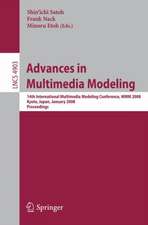Software Engineering with Computational Intelligence: The Springer International Series in Engineering and Computer Science, cartea 731
Editat de Taghi M. Khoshgoftaaren Limba Engleză Hardback – 30 apr 2003
| Toate formatele și edițiile | Preț | Express |
|---|---|---|
| Paperback (1) | 990.95 lei 6-8 săpt. | |
| Springer Us – 31 oct 2012 | 990.95 lei 6-8 săpt. | |
| Hardback (1) | 997.38 lei 6-8 săpt. | |
| Springer Us – 30 apr 2003 | 997.38 lei 6-8 săpt. |
Din seria The Springer International Series in Engineering and Computer Science
- 24%
 Preț: 1041.98 lei
Preț: 1041.98 lei - 20%
 Preț: 643.50 lei
Preț: 643.50 lei - 18%
 Preț: 1225.62 lei
Preț: 1225.62 lei - 18%
 Preț: 965.02 lei
Preț: 965.02 lei - 20%
 Preț: 646.12 lei
Preț: 646.12 lei - 18%
 Preț: 948.79 lei
Preț: 948.79 lei - 20%
 Preț: 646.62 lei
Preț: 646.62 lei - 15%
 Preț: 637.46 lei
Preț: 637.46 lei - 20%
 Preț: 643.83 lei
Preț: 643.83 lei - 18%
 Preț: 949.23 lei
Preț: 949.23 lei - 20%
 Preț: 644.48 lei
Preț: 644.48 lei - 20%
 Preț: 994.92 lei
Preț: 994.92 lei - 20%
 Preț: 645.97 lei
Preț: 645.97 lei - 18%
 Preț: 946.87 lei
Preț: 946.87 lei - 20%
 Preț: 995.57 lei
Preț: 995.57 lei - 18%
 Preț: 956.99 lei
Preț: 956.99 lei - 20%
 Preț: 644.98 lei
Preț: 644.98 lei - 15%
 Preț: 649.54 lei
Preț: 649.54 lei - 18%
 Preț: 950.21 lei
Preț: 950.21 lei - 18%
 Preț: 1221.38 lei
Preț: 1221.38 lei - 18%
 Preț: 957.62 lei
Preț: 957.62 lei - 15%
 Preț: 643.99 lei
Preț: 643.99 lei - 18%
 Preț: 948.47 lei
Preț: 948.47 lei - 18%
 Preț: 947.35 lei
Preț: 947.35 lei - 20%
 Preț: 1284.65 lei
Preț: 1284.65 lei - 20%
 Preț: 1628.31 lei
Preț: 1628.31 lei - 20%
 Preț: 1285.78 lei
Preț: 1285.78 lei
Preț: 997.38 lei
Preț vechi: 1246.73 lei
-20% Nou
Puncte Express: 1496
Preț estimativ în valută:
190.87€ • 198.54$ • 157.58£
190.87€ • 198.54$ • 157.58£
Carte tipărită la comandă
Livrare economică 15-29 aprilie
Preluare comenzi: 021 569.72.76
Specificații
ISBN-13: 9781402074271
ISBN-10: 1402074271
Pagini: 361
Ilustrații: XI, 361 p.
Dimensiuni: 155 x 235 x 22 mm
Greutate: 0.7 kg
Ediția:2003
Editura: Springer Us
Colecția Springer
Seria The Springer International Series in Engineering and Computer Science
Locul publicării:New York, NY, United States
ISBN-10: 1402074271
Pagini: 361
Ilustrații: XI, 361 p.
Dimensiuni: 155 x 235 x 22 mm
Greutate: 0.7 kg
Ediția:2003
Editura: Springer Us
Colecția Springer
Seria The Springer International Series in Engineering and Computer Science
Locul publicării:New York, NY, United States
Public țintă
Professional/practitionerCuprins
1. Applying Machine Learners to GUI Specifications in Formulating Early Life Cycle Project Estimations.- 2. Applying Fuzzy Logic Modeling to Software Project Management.- 3. Integrating Genetic Algorithms with Systems Dynamics to Optimize Quality Assurance Effort Allocation.- 4. Improved Fault-Prone Detection Analysis of Software Modules Using an Evolutionary Neural Network Approach.- 5. A Fuzzy Model and the AdeQuaS Fuzzy Tool: a theoretical and a practical view of the Software Quality Evaluation.- 6. Software Quality Prediction Using Bayesian Networks.- 7. Towards the Verification and Validation of Online Learning Adaptive Systems.- 8. Experimenting with Genetic Algorithms to Devise Optimal Integration Test Orders.- 9. Automated Test Reduction Using an Info-Fuzzy Network.- 10. A Genetic Algorithm Approach to Focused Software Usage Testing.- 11. An Expert System for Suggesting Design Patterns - A Methodology and a Prototype.- 12. Condensing Uncertainty via Incremental Treatment Learning.




























